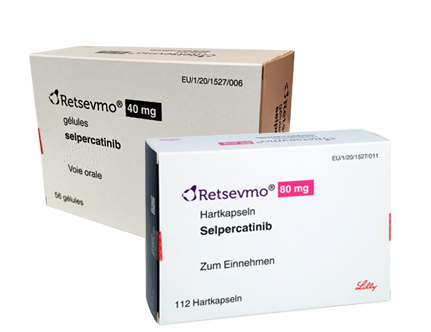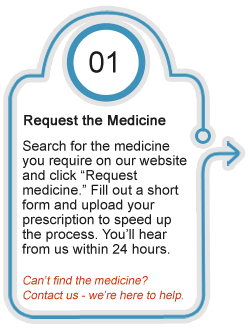What is Retsevmo (selpercatinib) used for?
Retsevmo (selpercatinib) is a targeted cancer therapy known as a kinase inhibitor. It is prescribed for the treatment of the following RET-driven cancers:[1]
- RET fusion-positive non-small cell lung cancer (NSCLC) that has spread (metastasized) in adults.
- Advanced or metastatic RET-mutant medullary thyroid cancer (MTC) in patients 12 years and older who require systemic therapy.
- Advanced or metastatic RET fusion-positive thyroid cancer in patients 12 years and older who require systemic therapy and have not responded to, or are no longer responding to, radioactive iodine treatment.
It is available in 40 mg and 80 mg oral capsules. Retsevmo is the first approved treatment specifically designed for tumors with RET gene alterations.[1]
How does Retsevmo (selpercatinib) work?
Retsevmo (selpercatinib) works by inhibiting abnormal activity of the RET tyrosine kinase, which plays a role in the growth of certain cancers. Mutations or fusions involving the RET gene can lead to uncontrolled cancer cell growth.[2,3]
Selpercatinib blocks the RET protein, helping to stop or slow down the growth of cancer cells and potentially cause tumor cell death.[1]
Where is Retsevmo (selpercatinib) approved?
Retsevmo received approval from the U.S. Food and Drug Administration (FDA) on May 8, 2020, for RET-driven lung and thyroid cancers.[4]
The approval was granted under Accelerated Approval, along with Priority Review, Breakthrough Therapy Designation, and Orphan Drug Status — regulatory programs that support faster development of drugs addressing serious and rare diseases.[4]
Note: Retsevmo may be approved in other countries as well. If you’re seeking information about availability in a specific region, feel free to contact our support team.
How is Retsevmo (selpercatinib) taken?
The recommended dose depends on body weight:[1]
- Less than 50 kg: 120 mg twice daily
- 50 kg or more: 160 mg twice daily
Retsevmo is taken orally, approximately every 12 hours. Doses may need to be adjusted if the patient is taking acid-reducing agents, CYP3A inhibitors, or if they experience significant side effects or liver impairment.[1]
Treatment is guided by genetic testing to confirm the presence of a RET mutation or fusion in tumor tissue or blood.
Always consult your healthcare provider for personalized dosing and management.
Are there known side effects or risks with Retsevmo (selpercatinib)?
Common side effects (≥20% of patients)[1]:
- Dry mouth
- Diarrhea or constipation
- Nausea
- Abdominal pain
- Fatigue
- Swelling (edema)
- Rash
- Headache
- Abnormal lab results (e.g. liver enzymes, blood sugar, low white blood cell or platelet counts, low calcium or protein levels)
Serious adverse reactions may include:[1]
- Liver injury (hepatotoxicity)
- High blood pressure (hypertension)
- Prolonged QT interval (affecting heart rhythm)
- Risk of bleeding (hemorrhage)
Use in specific populations
Retsevmo can cause harm to an unborn baby, so it is not recommended during pregnancy or breastfeeding. Appropriate contraception should be used during treatment.[1]
For detailed safety and dosing information, refer to the official prescribing information or speak with your doctor.
References
1. Full prescribing information [FDA]: Retevmo (selpercatinib) [PDF]
Loxo Oncology, May 2020
2. Compound Summary: Selpercatinib
National Library of Medicine, National Center for Biotechnology Information, last checked on Sept 9, 2020
3. RET fusion in advanced non-small-cell lung cancer and response to cabozantinib
Wang Y, Medicine (Baltimore), Jan 18, 2019 4. FDA Approves First Therapy for Patients with Lung and Thyroid Cancers with a Certain Genetic Mutation or Fusion
FDA press release, May 8, 2020





